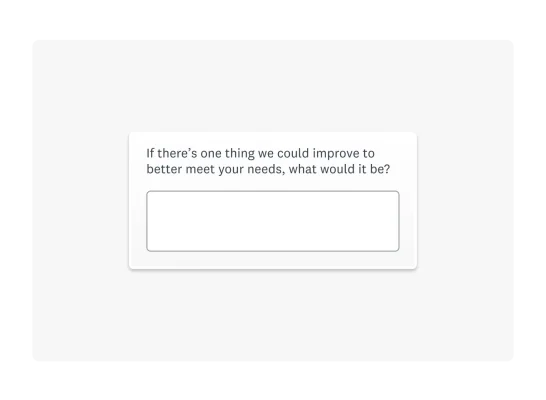Marketing surveys: A guide to learning what your customers want
Learn how to use marketing surveys to gather insights from customers and inform your marketing strategies.

- A marketing survey is a type of market research used to gather data and insights from a target audience about their preferences, behaviors, and opinions.
- Surveys offer insights that help businesses tailor strategies, address pain points, improve products, and make data-driven decisions.
- Turn marketing surveys into a feedback system by regularly collecting and acting on survey responses to enhance customer experiences.
Understanding what motivates your target audience is a challenge every marketing professional encounters. Whether launching a new business or managing an established brand, incorporating surveys into your marketing campaigns can be highly beneficial.
Marketing surveys are one of the most efficient and effective market research methods. With marketing surveys, you can gather valuable information about your target audience's demographics, opinions, and motivations. Use customer data from online surveys to guide your marketing strategies and drive business growth.
In this article, we’ll explain the different types of marketing surveys and how they can be used to craft better marketing strategies.
What is a marketing survey?
Marketing surveys are a powerful tool for gathering data and actionable insights from customers and prospects, enabling you to better engage your audience. These surveys are often online, making them easy to send to customers via email or SMS.
There are several types of marketing surveys designed to gather information from different audiences.
The format and question types you select for a marketing survey determine the data you can collect—quantitative and qualitative. Together, these insights can inform your strategies for reaching more customers.
Why should I use marketing surveys?
Marketing surveys are essential for conducting market research. They can gather consumer data to inform product development, marketing strategies, ad campaign development, and more.
The top benefits of using marketing surveys include:
- Cost-effectiveness: Consumer or market research surveys can be much more cost-effective and provide a broader reach than focus groups or panels. While focus groups are great, customers are typically compensated in some way. By sending a survey to existing customers, you can gather valuable feedback often at cost-effective rates.
- Agile research method: Marketing surveys are typically more agile than other research methods. With SurveyMonkey, you can launch quickly using our survey templates and get results in minutes.
- Track trends over time: You can benchmark results and track trends to compare your performance with others in your industry. These trends can also offer valuable insights for product development and marketing teams, helping them better serve consumers.
- Follow up with customers: A customer service survey is an effective way to follow up with customers after customer journey touchpoints, such as making a purchase, visiting your website, or signing up for your newsletter. Follow-up surveys can gauge how customers perceive your organization. This can help your business improve the customer experience (CX) to boost brand reputation and promote customer loyalty.
- Versatile distribution: Send surveys via email, SMS, website, point of sale (POS) pop-ups, or offline on mobile devices at events. The opportunities to gather valuable data and insights from customers through marketing surveys are endless.
Needless to say, there are plenty of reasons to consider implementing these surveys into your marketing plans.
The 4 main types of marketing surveys
Marketing surveys can be utilized in any industry to gain deeper insights into the customer experience or to access market research panels for competitive intelligence on your target market. While different types of marketing surveys often overlap, here are the four most popular types, along with examples.
1. General market research surveys
General market research surveys empower businesses to make strategic decisions by providing precise data on customers, trends, and competitors. Read our Ultimate Guide to Market Research for more in-depth information on market research.
You can perform market research with surveys to:
- Understand consumer usage and attitudes: Drive better marketing strategies by uncovering how your existing and potential customers feel about your products or services. Gather in-depth data on consumer preferences and spending habits to inform how to promote your business and products.
- Conduct pricing research: Conduct market research to discover what your target market is willing to pay for your products. Optimize your prices to take advantage of untapped revenue potential.
- Gain customer insights: You can partner with teams across your organization to survey at different touchpoints, like collecting feedback after a customer service interaction.
You can also use general market research and polling surveys to understand more about your target market with questions like:
- How do you typically find out about brands in this product category?
- Are you the primary decision-maker in your household regarding purchasing this product category?
- Which factors are important to you when you decide which brands to purchase?

2. Product development surveys
Product development transforms an idea into a tangible product by evaluating its feasibility, marketability, and potential performance in the marketplace.
You can use product development surveys to collect feedback and gather proof points on the following:
- Concept testing: Concept testing allows you to assess how consumers will receive a product before it goes to market. The gathered quantitative data provides the evidence needed to justify an investment in a product or service.
- Logo design: Logo design testing is a critical part of product development. Gather data on consumer design preferences with logo design surveys showcasing different variations of a potential logo.
- Package testing: Package testing allows you to optimize your designs, planograms, and concepts for the greatest appeal. Test packaging designs to see what your target audience responds to.
- Idea screening: Test early-stage products to get feedback from your target audience on design or ad concepts to determine which ideas have the strongest appeal.
- MaxDiff analysis: MaxDiff analysis surveys use an analytic methodology to gauge respondents' preferences for different items and rank those attributes in a best-worst ranking. These surveys can help you make better decisions during product development.
- Conjoint analysis: Conjoint analysis is a statistical method used to understand how customers value different product features. It helps determine the combination of attributes that impact consumers’ perceived product value.
Fortunately, you can customize our product development survey templates to determine which products or services will most likely succeed with your target market.
3. Brand tracking surveys
Brand tracking surveys help measure and improve your brand’s perception by tracking changes in how consumers view different brands on the market. To build a stronger and better-received brand, you can utilize these survey types:
- Awareness: Get your brand name out there by measuring brand recognition through brand awareness surveys. These surveys tell you what is working and what needs improvement to inform your future brand strategy.
- Reputation: A positive brand reputation is vital for attracting new customers, retaining existing ones, and driving sales for your business. Track your brand reputation through sentiment analysis and feedback to ensure customers see your brand well.
- Attributes: Identify what attributes set your brand apart by asking customers for feedback in a quick and easy survey. Sharpen your messaging and hone in on the attributes that matter to customers with this insight.
- Equity: Measure and improve your brand equity by asking customers about their perception of your brand and why they are loyal or unloyal.
- Loyalty: Net Promoter® Score (NPS) surveys measure customers’ likelihood to recommend your brand. These scores gauge customer loyalty, satisfaction, and experience.

Our Brand Tracking Survey Template offers expertly crafted survey questions such as:
- Thinking about [COMPANY], what word or short phrase comes to mind?
- For your next purchase, which [CATEGORY] brand would you buy?
- When deciding on a [CATEGORY], how important are each of the following attributes?
4. Content marketing surveys
You can use surveys to help your content marketing efforts reach the right target audience. From planning an editorial calendar to finding messaging that moves the needle, content marketing surveys allow you to glean valuable insights.
The following content marketing surveys all play a role in making content shine:
- Lead generation: Learn more about your target audience to help you gain more customers.
- Website feedback: Gather feedback from website visitors to determine if your site is user-friendly. Gauge how well your website is performing by asking website visitors what’s working and what’s missing.
- Ad testing: Test different ad creatives to see which stands out to consumers.
- Message and claims testing: Measure the effectiveness of slogans, taglines, value propositions, company positioning, and more with SurveyMonkey.
- Name testing: Before releasing your latest product or brand, test what names consumers like most.
- Personalization: Use content marketing surveys to monitor what information customers are looking for in content. Get details on how to personalize your content strategy to specific market segments and boost customer experience.
SurveyMonkey makes it easy to gather information from your target audience about what they want to see in your upcoming content marketing.
Ask questions like these with our Content Strategy Survey Template to guide your content planning:
- When you share information about companies and their products or services, which of the following do you use? (Select all that apply)
- How often would you want to receive information from our company?
- What information would you like to see our company provide?
Best practices for analyzing your marketing surveys
The following survey best practices ensure that you gather reliable data and that your analysis is accurate.
- Keep surveys brief. According to our research on survey length, it’s in the best interest of your response rate and data reliability to ensure your survey is concise. To create a concise survey, set clear goals to focus your questions.
- Weight your surveys. Weighting a survey allows you to make the sample of respondents appear closer to the broader population you’re interested in studying.
- Know when to embrace relativity. Making sense of the numbers can be a tricky feat. Learn when to use numbers and when to use percentages.
- Look at the raw number of responses. Examining the “frequencies” gives you a good picture of your data.
- Use comparison groups. See how your results compare to competitors or other organizations by checking into other data available.
How to turn surveys into a marketing feedback system
Improvement requires actively seeking feedback and iterating based on the results. This is why transforming surveys into a marketing feedback system is crucial.
Here is some helpful advice on turning surveys into a marketing feedback system:
- Build a survey research program. Ad hoc surveys can be useful, but developing a holistic survey research program helps drive growth by collecting continuous feedback and data to inform your strategy formulation.
- Use surveys in your CRM. Integrating surveys with your Customer Relationship Management (CRM) software lets you automate feedback surveys at vital customer touchpoints. Additionally, you can automate triggers for targeted follow-up care.
- Use a single survey multiple times. To get repeated value from a single survey, consider benchmarking results and tracking changes, transitioning to a longitudinal study, or replicating results to prove a theory.
Continuously using surveys can help you make targeted improvements that impact brand awareness and customer loyalty while driving sales for your business. See the difference implementing surveys into your marketing process can make.
Sample online marketing survey templates
Ready to find out what your customers want? Sign up for SurveyMonkey to start creating your own surveys, or begin with one of our expert-written marketing survey templates:
- Brand Awareness Template
- Business to Business Template
- Customer Comments Template
- Customer Satisfaction Template
- Customer Service Feedback Template
- Customer Support Template
- Firmographics Template
- Market Research – Product Template
- Market Research – Service Template
- Market Research Template
- Media Usage Template
- Household Budget Template
- Net Promoter® Score (NPS) Template
- NPS and Brand Loyalty Template
- Online Content Strategy Template
- Online Social Networking Template
- Retail Customer Feedback Template
- Software Evaluation Template
- Target Market Analysis Template
- Target Market Demographics Template
- Typical Customer Analysis Template
- Typical Customer Demographics Template
- U.S. Demographics – Snapshot Template
- U.S. Demographics Template
- Website Design Feedback Template
NPS®, Net Promoter® & Net Promoter® Score are registered trademarks of Satmetrix Systems, Inc., Bain & Company and Fred Reichheld.
Discover more resources

Understand your target market to fuel explosive brand growth
Brand marketing managers can use this toolkit to understand your target audience, grow your brand, and prove ROI.

How SurveyMonkey uses surveys for marketing

How to design a market research survey in 4 steps
SurveyMonkey shares how to design an effective market research survey and tips for writing the best survey questions for your business.

How to use the 4 Ps of marketing for successful campaigns
Master the 4 Ps—Product, Price, Place, and Promotion—and discover how to use them to create a marketing strategy that drives results.